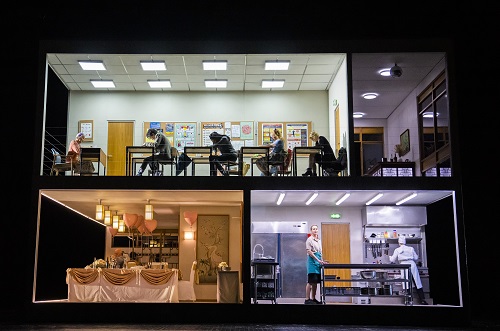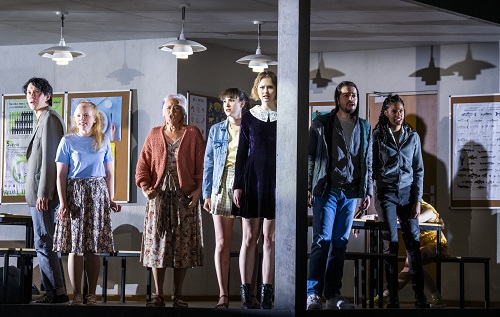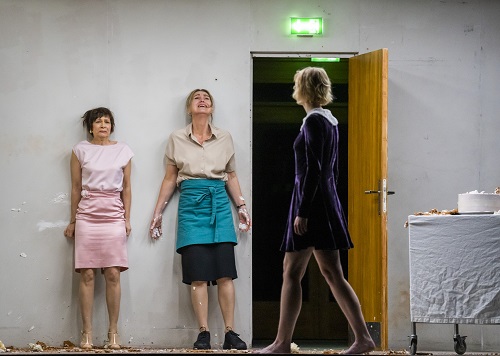Kaija Saariaho’s latest opera, first seen at the 2021 Festival d’Aix en Provence, has now reached another of its co-commissioners, the Royal Opera House. It would be difficult to overstate the impression it made, not only on me but clearly on the rest of a nearly full house. Moving away — on account, it seems, of Kasper Holten’s initial brief — from various reimaginings of different pasts to the near-present, Innocence, written with librettist Sofia Oksanen and translator (from Finnish into multiple languages) Alekis Barrière, is a concentrated work, ideally judged on an Elektra-like timescale, with neither a spare note nor moment.
The work ranges between a nearer past and present, as guests and workers at a wedding find themselves confronted still more strongly than they are every day by the trauma of a school shooting that took place ten years previously. The complementary complexity of their memory arcs— musical as much as verbal, linguistic as well as harmonic, all seemingly conceived as one, albeit through collaboration rather than through Wagnerian control—is on the one hand readily apparent, yet on the other, as two scenarios, two times merge, one fancies at least that one can readily take in what is taking place as well as what has, what is sung and spoken as well as what the orchestra says, what unfolds in Simon Stone’s staging (and Chloe Lamford’s Alvar Aalto-inspired sets) as well as in the score. There is no contemporary overload, no video, let alone live film, nothing especially post-dramatic. If this is rather more than a ‘well-made play’, there is something satisfyingly clear and balanced to its route, to its proportions, and indeed to its accessible yet far from simple musical language.

Collaborations take many forms, some relishing conflict and contradiction; here, we stand dramaturgically closer to recent works by the likes of George Benjamin than, say, Harrison Birtwistle. There is room for both and for more—and there always has been. There seems no reason, however, to doubt that Saariaho’s opera – and that is unquestionably a shorthand for all involved, the composer first among equals – deserves, indeed quietly, subtly demands to be spoken of in the same breath as works such as Lessons in Love and Violence and The Minotaur, to take two exemplary full-scale contemporary operas seen relatively recently here at Covent Garden.
For more often than not – some might take an essentialist, neo-Aristotelian line, but let us not go there for now – tragedy ultimately takes a straightforward trajectory. Here, two tragedies feed and merge, feeding on one another, indeed finding their being in memory and trauma. Trauma is perhaps the key to the libretto, fragmented and united in translation, the children and parents of an international school each finding their mode of musical and verbal expression, written and performative, through negotiation of complementary ‘nationality’. Some characters speak; some sing; some do both. One, Markéta, employs Finno-Ugric folksong techniques. Saariaho writes for all in turn, even having made computer analyses of the words she had also heard spoken by natives. ‘It was a crazy, long, complex composition process and one that I will never in my life return to,’ she owns in the programme.

Some characters flit between languages, just as many Europeans and ‘citizens of the world’ do on a daily basis, translating or not, testing the limits of so much often without realising. (I recalled an extraordinary Don Giovanni at Vienna’s Volksoper, in which Achim Freyer mixed German and Italian, even within numbers, to heightened dramatic, if often inexplicable, effect.) This is not, thank goodness an opera for Mrs May of Maidenhead. And, indeed, to a London audience, thoughts of our own hostage situation with a nationalist far-Right, removing us from our own international school, can never be far away. We, traumatised as we are by the events of not far short of a decade, reliving them as if they were yesterday, whilst confronted by their consequences and, for their perpetrators, apparent lack of them, will make our own connections—even as the rest of our fellow Europeans have moved on, or seem to have done so.
Yet no one ever really moves on, it seems; and though such reception is doubtless beside the point for many, and will surely seem self-indulgent in the wake of events to the east, it is our lot as heightened familial and interfamilial clashes are to the world created here. Stone’s tendency, in classical works, to ‘reduce’ or at least to ‘translate’ to new contemporary worlds is more or less redundant in this case. He concentrates, with considerable self-effacement, on telling the stories, layered as in words and music, and does so very well. Polyphony – perhaps a nod to Berio and Eco, or at least a similarity or two – is the order of the constructive day. Its web, though, is weaved with that still-strange hyper-immediacy one recognises from the most successful spectralist music (if we should still label it that or indeed anything other than itself). Saariaho’s ear for instrumentation never errs, yet likewise never merely conforms to the expected, however ‘natural’, even necessary, her choices may sound.

The opening, de profundis piano, contrabassoon, and timpani, scrunching seconds necessitating melody, light, and development that yet will always return to the source, contain within itself the seeds of what is to come. Its Fatal quality balances Nature and chance, summoning spectres to a feast as terrible in its way as that of Mahler’s Das klagende Lied. If I heard parallels with, say, the passage of Gérard Grisey’s Quatre chants pour franchir le seuil, I am not sure that tells us more much than that one might sometimes hear Schumann in Brahms. Perhaps the way of handling development in time, the directed proliferation that seems to create a genuinely new musical dramaturgy, might claim roots there, albeit germinating and spreading in the different setting of an actual theatre. I note it just in case. At any rate, to seek ‘influence’ at this stage of Saariaho’s career may be to turn down a blind alley. There is trauma, though, in the musical shadows as much as the verbal, in Arco Renz’s choreography too.
And there are shockingly good performances too, whether from the Orchestra of the Royal Opera House, which might have convinced one it played such music all the time; from Susanna Mälkki, who surely had more than a hand in making one think so; or from an excellent cast recreating the work before our eyes and ears. Sandrine Piau and Christopher Purves, parents to the shooter and the bridegroom, turned their mutually uncomprehending argument over whether the new addition to their family, Stela (Lilian Farahani), should learn of ‘the tragedy’ into something musically and dramatically generative. Farahani and her intended, Markus Nykänen’s Tuomas, engaged our sympathies and our frustrations, often at once, as they struggled through an impossible, fatal (re)discovery. Jenny Carlstedt’s Tereza, mother of one of the slaughtered children and now a waitress at the wedding, transformed her inability to forget, let alone to forgive, into the centrepiece of the work. But all contributed sincerely and, in their different ways, exceptionally, be it Julie Hega as the French friend of the boy pushed beyond endurance, Vilma Jää’s haunting Markéta, or Lucy Shelton’s helpless, terrified, yet ultimately strong Teacher, responsible yet not. Such, we learned, was true of all concerned, the bullied, harried boy-shooter included. Without tricks of false empathy or other sleights of hand, the complex polyphony of the piece offered above all a powerful reminder that scapegoating, that easy solutions, are often the truest source of our problems.
Mark Berry
Kaija Saariaho: Innocence (UK premiere)
The Waitress (Tereza) – Jenny Carlstedt, The Mother-in-law (Patricia) – Sandrine Piau, The Father-in-law (Henrik) – Christopher Purves, The Bride (Stela) – Lilian Farahani, The Bridegroom (Tuomas) – Markus Nykänen, The Priest – Timo Riihonen, The Teacher (Cecilia) – Lucy Shelton, Student One (Markéta) – Vilma Jää, Student Two (Lilly) – Beate Mordal, Student Three (Iris) – Julie Hega, Student Four (Anton) – Simon Kluth, Student Five (Jerónimo) – Camilo Delgado Díaz, Student Six (Alexia) – Marina Dumont; Director – Simon Stone, Conductor – Susanna Mälkki, Set designs – Chloe Lamford, Costumes – Mel Page, Lighting – James Farncombe, Choreography – Arco Renz, Royal Opera Chorus (chorus master, Genevieve Ellis), Orchestra of the Royal Opera House.
Royal Opera House, Covent Garden, London; Monday 17th April 2023.
ABOVE: Innocence ROH © Tristram Kenton